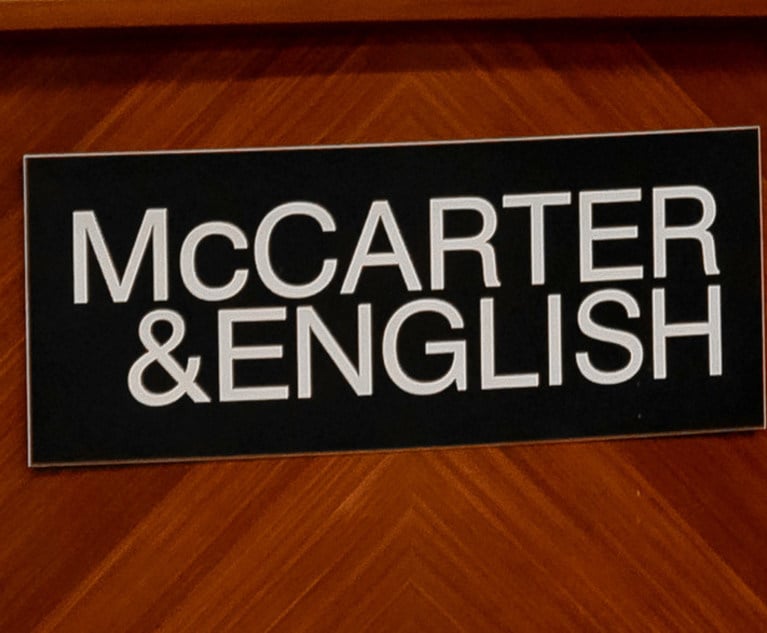Technology Offers Law School Grads New Ways to Tap into the Job Market
Several tools can help future attorneys and legal tech careerists land their first job, though they all take a markedly different approaches to get there.
September 29, 2017 at 03:47 PM
11 minute read
The original version of this story was published on New Jersey Law Journal

Attorneys in or fresh out of law school have some new technologies at their disposal for getting into the job market. Here's a look at some of the new tools helping new lawyers get a foot in the door to their legal career.
Teaching What Law Schools Don't: Networking
Among databases of legal job listings, and how-to resume and interview guides, some law schools around the country are offering something novel. It is a tool that instead of automatically introducing students to legal employers teaches them how to make their own connections.
Lawcountability J.D., a cloud-based app that offers instructional videos on how prospective attorneys can market themselves and network, was recently deployed in over U.S. 70 law schools nationwide. One of those law schools is Arizona State University's Sandra Day O'Connor College of Law, where Alfred Ray English, assistant dean at the Office of Career and Employment Services, was open to offering the technology to its law school students. He noted that the app is pivotal for students given that the majority of legal jobs “are procured through professional networking.”
“It is important laws school students learn to network and understand the importance networking plays in finding legal jobs post-graduation and beyond,” he said.
The Lawcountability J.D. curriculum was created by Ari Kaplan, legal advisor and founder of Ari Kaplan Advisors, and consists of 10-minute webinars which come out weekly. Kaplan explained that these webinars focus on how students “can raise their profiles and network more effectively with potential employers. It also provides guidance on follow-up, social media, and creating content.”
In addition, Kaplan said that each webinar's program is associated with three tasks, such as creating a LinkedIn profile, to help students turn lessons into action. Tasks can be tracked through the app, which gives a point value for each task completed “to promote gamification and benchmarking.”
The deployment of Lawcountability J.D. in law schools is being supported by bar exam preparation company The BARBI Group, which will offer scholarships to four students who watch all the webinars and complete all related tasks. The winners will be selected by Lawcountability.
Peter Frey, CTO at BARBI, said the scholarships would entail a free BARBRI review course for each student. He added that Lawcountability J.D's networking-focused webinars are useful for law students because while schools help them “think like a lawyer,” they do not offer enough “practical skills that help them with business side of the law.”
Recruiters Go the Way of Analytics
While networking is key pillar to any job search, prospective attorneys also need to be able to get their resumes in the hands of the most receptive employers. And some recruiters are relying on advanced technology to match companies with jobseekers.
TRU Staffing Partners, a recruiting company focused on placing e-discovery and cybersecurity professionals, is building specific job seeker profiles and analytics insights into its databases and customer relationship management (CRM) platform to better match potential employees with law firms and companies. Jared Coseglia, founder and CEO of TRU Staffing Partners, noted that while these analytics are still in development, and for now only used internally, the agency hopes to offer them publically by mid-2018.
“By the middle of next year, if you're registered with TRU you will have the ability, if you want, to receive real time updates for jobs that are available based on how you self-coded yourself,” and whether your skills match employers requirements, Coseglia said.
Such technology is not novel to TRU Staffing Partners; many recruiting agencies have developed similar programs. But it is something that Coseglia believes is lacking in the highly competitive e-discovery and cybersecurity job space.
“I would argue that there is nobody in e-discovery and cybersecurity is doing that, and if they are, they are not doing it effectively at all,” he said.
Coseglia said recruiting agencies can stand out based on the precision and scope of their analytics.
“I don't think there is anyone that I am aware of that has their job seekers fill out nuanced Relativity, Nuix and other related checklists if they are [looking for] data processing or e-discovery jobs,” he said.
Need Legal Work? There's an App for that
While recruiters are leveraging analytics to better understand their clients, other companies are using technology to cut out the middle man and make finding work as easy as creating an online profile.
Enter Mplace, an app that allows law firms and corporations to scroll through and choose lawyers for certain one-time projects. Lawyers can sign up for the app by creating a profile that lists their qualifications and contains their resume. Caleb King, co-founder of Mplace, noted that the app is used by many new lawyers who have just entered the profession. For now, the projects listed on the app “focus exclusively on sourcing [attorneys] for document review projects,” he said.
While the jobs are on the app are “not something per se that people want to make a career out of, it's an effective way to get cash flow for people” and to build experience and connections, he said.
King believes one of the main benefits of Mplace is that job seekers “actually get in real time an offer they can accept as opposed to the more traditional workflow,” where they receive calls from recruiters discussing potential employers.
For the time being, however, Mplace only offers jobs around document review projects. While some may believe that document review projects are not the most in-demand work for attorneys given advances in e-discovery technology, King disagrees. “There has been a race going on for decades now between the size of the corpus of documents to be reviewed which is growing exponentially and software's ability to review those documents. And so the human piece of the puzzle will be a part of it for the foreseeable future.”

Attorneys in or fresh out of law school have some new technologies at their disposal for getting into the job market. Here's a look at some of the new tools helping new lawyers get a foot in the door to their legal career.
Teaching What Law Schools Don't: Networking
Among databases of legal job listings, and how-to resume and interview guides, some law schools around the country are offering something novel. It is a tool that instead of automatically introducing students to legal employers teaches them how to make their own connections.
Lawcountability J.D., a cloud-based app that offers instructional videos on how prospective attorneys can market themselves and network, was recently deployed in over U.S. 70 law schools nationwide. One of those law schools is Arizona State University's Sandra Day O'Connor College of Law, where Alfred Ray English, assistant dean at the Office of Career and Employment Services, was open to offering the technology to its law school students. He noted that the app is pivotal for students given that the majority of legal jobs “are procured through professional networking.”
“It is important laws school students learn to network and understand the importance networking plays in finding legal jobs post-graduation and beyond,” he said.
The Lawcountability J.D. curriculum was created by Ari Kaplan, legal advisor and founder of Ari Kaplan Advisors, and consists of 10-minute webinars which come out weekly. Kaplan explained that these webinars focus on how students “can raise their profiles and network more effectively with potential employers. It also provides guidance on follow-up, social media, and creating content.”
In addition, Kaplan said that each webinar's program is associated with three tasks, such as creating a
The deployment of Lawcountability J.D. in law schools is being supported by bar exam preparation company The BARBI Group, which will offer scholarships to four students who watch all the webinars and complete all related tasks. The winners will be selected by Lawcountability.
Peter Frey, CTO at BARBI, said the scholarships would entail a free BARBRI review course for each student. He added that Lawcountability J.D's networking-focused webinars are useful for law students because while schools help them “think like a lawyer,” they do not offer enough “practical skills that help them with business side of the law.”
Recruiters Go the Way of Analytics
While networking is key pillar to any job search, prospective attorneys also need to be able to get their resumes in the hands of the most receptive employers. And some recruiters are relying on advanced technology to match companies with jobseekers.
TRU Staffing Partners, a recruiting company focused on placing e-discovery and cybersecurity professionals, is building specific job seeker profiles and analytics insights into its databases and customer relationship management (CRM) platform to better match potential employees with law firms and companies. Jared Coseglia, founder and CEO of TRU Staffing Partners, noted that while these analytics are still in development, and for now only used internally, the agency hopes to offer them publically by mid-2018.
“By the middle of next year, if you're registered with TRU you will have the ability, if you want, to receive real time updates for jobs that are available based on how you self-coded yourself,” and whether your skills match employers requirements, Coseglia said.
Such technology is not novel to TRU Staffing Partners; many recruiting agencies have developed similar programs. But it is something that Coseglia believes is lacking in the highly competitive e-discovery and cybersecurity job space.
“I would argue that there is nobody in e-discovery and cybersecurity is doing that, and if they are, they are not doing it effectively at all,” he said.
Coseglia said recruiting agencies can stand out based on the precision and scope of their analytics.
“I don't think there is anyone that I am aware of that has their job seekers fill out nuanced Relativity, Nuix and other related checklists if they are [looking for] data processing or e-discovery jobs,” he said.
Need Legal Work? There's an App for that
While recruiters are leveraging analytics to better understand their clients, other companies are using technology to cut out the middle man and make finding work as easy as creating an online profile.
Enter Mplace, an app that allows law firms and corporations to scroll through and choose lawyers for certain one-time projects. Lawyers can sign up for the app by creating a profile that lists their qualifications and contains their resume. Caleb King, co-founder of Mplace, noted that the app is used by many new lawyers who have just entered the profession. For now, the projects listed on the app “focus exclusively on sourcing [attorneys] for document review projects,” he said.
While the jobs are on the app are “not something per se that people want to make a career out of, it's an effective way to get cash flow for people” and to build experience and connections, he said.
King believes one of the main benefits of Mplace is that job seekers “actually get in real time an offer they can accept as opposed to the more traditional workflow,” where they receive calls from recruiters discussing potential employers.
For the time being, however, Mplace only offers jobs around document review projects. While some may believe that document review projects are not the most in-demand work for attorneys given advances in e-discovery technology, King disagrees. “There has been a race going on for decades now between the size of the corpus of documents to be reviewed which is growing exponentially and software's ability to review those documents. And so the human piece of the puzzle will be a part of it for the foreseeable future.”
This content has been archived. It is available through our partners, LexisNexis® and Bloomberg Law.
To view this content, please continue to their sites.
Not a Lexis Subscriber?
Subscribe Now
Not a Bloomberg Law Subscriber?
Subscribe Now
NOT FOR REPRINT
© 2025 ALM Global, LLC, All Rights Reserved. Request academic re-use from www.copyright.com. All other uses, submit a request to [email protected]. For more information visit Asset & Logo Licensing.
You Might Like
View All
Are Counsel Ranks Getting 'Squeezed' as Nonequity and Associate Pay Grows?
5 minute read

Why Hogan Lovells and Perkins Coie Reversed, Will Now Pay Out Special Bonuses to Associates
4 minute read
Former McCarter & English Associate Fired Over 'Gangsta Rap' LinkedIn Post Sues Over Discrimination, Retaliation
6 minute readTrending Stories
Who Got The Work
J. Brugh Lower of Gibbons has entered an appearance for industrial equipment supplier Devco Corporation in a pending trademark infringement lawsuit. The suit, accusing the defendant of selling knock-off Graco products, was filed Dec. 18 in New Jersey District Court by Rivkin Radler on behalf of Graco Inc. and Graco Minnesota. The case, assigned to U.S. District Judge Zahid N. Quraishi, is 3:24-cv-11294, Graco Inc. et al v. Devco Corporation.
Who Got The Work
Rebecca Maller-Stein and Kent A. Yalowitz of Arnold & Porter Kaye Scholer have entered their appearances for Hanaco Venture Capital and its executives, Lior Prosor and David Frankel, in a pending securities lawsuit. The action, filed on Dec. 24 in New York Southern District Court by Zell, Aron & Co. on behalf of Goldeneye Advisors, accuses the defendants of negligently and fraudulently managing the plaintiff's $1 million investment. The case, assigned to U.S. District Judge Vernon S. Broderick, is 1:24-cv-09918, Goldeneye Advisors, LLC v. Hanaco Venture Capital, Ltd. et al.
Who Got The Work
Attorneys from A&O Shearman has stepped in as defense counsel for Toronto-Dominion Bank and other defendants in a pending securities class action. The suit, filed Dec. 11 in New York Southern District Court by Bleichmar Fonti & Auld, accuses the defendants of concealing the bank's 'pervasive' deficiencies in regards to its compliance with the Bank Secrecy Act and the quality of its anti-money laundering controls. The case, assigned to U.S. District Judge Arun Subramanian, is 1:24-cv-09445, Gonzalez v. The Toronto-Dominion Bank et al.
Who Got The Work
Crown Castle International, a Pennsylvania company providing shared communications infrastructure, has turned to Luke D. Wolf of Gordon Rees Scully Mansukhani to fend off a pending breach-of-contract lawsuit. The court action, filed Nov. 25 in Michigan Eastern District Court by Hooper Hathaway PC on behalf of The Town Residences LLC, accuses Crown Castle of failing to transfer approximately $30,000 in utility payments from T-Mobile in breach of a roof-top lease and assignment agreement. The case, assigned to U.S. District Judge Susan K. Declercq, is 2:24-cv-13131, The Town Residences LLC v. T-Mobile US, Inc. et al.
Who Got The Work
Wilfred P. Coronato and Daniel M. Schwartz of McCarter & English have stepped in as defense counsel to Electrolux Home Products Inc. in a pending product liability lawsuit. The court action, filed Nov. 26 in New York Eastern District Court by Poulos Lopiccolo PC and Nagel Rice LLP on behalf of David Stern, alleges that the defendant's refrigerators’ drawers and shelving repeatedly break and fall apart within months after purchase. The case, assigned to U.S. District Judge Joan M. Azrack, is 2:24-cv-08204, Stern v. Electrolux Home Products, Inc.
Featured Firms
Law Offices of Gary Martin Hays & Associates, P.C.
(470) 294-1674
Law Offices of Mark E. Salomone
(857) 444-6468
Smith & Hassler
(713) 739-1250








